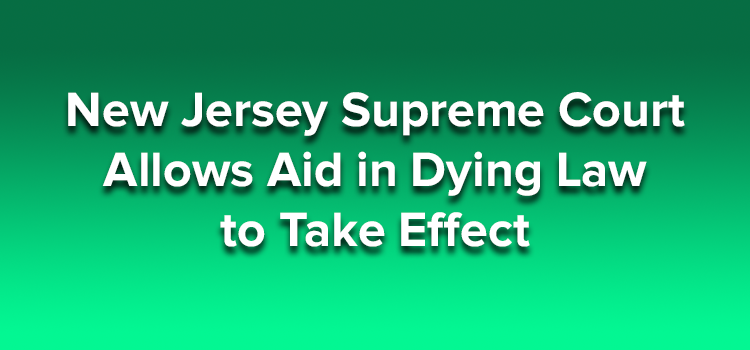The New Jersey Supreme Court will not stand in the way of the New Jersey Medical Aid in Dying for the Terminally Ill Act (Act), which allows terminally ill patients to end their own lives. The state’s highest court upheld the Appellate Division’s order in Glassman v. Grewal, which removed the temporary restraints that had prevented the Attorney General from enforcing the law.

New Jersey Medical Aid in Dying for the Terminally Ill Act
On April 12, 2019, Governor Phil Murphy signed the Medical Aid in Dying for the Terminally Ill Act into law, with an effective date of August 1, 2019. The law authorizes an attending physician to write a prescription for medication that would enable a qualified terminally ill patient to end his or her life. As set forth in the Medical Aid in Dying for the Terminally Ill Act, the statute expresses New Jersey’s “right of a qualified terminally[-]ill patient, protected by appropriate safeguards, to obtain medication that the patient may choose to self-administer in order to bring about the patient’s humane and dignified death.”
Under the Act, “terminally ill” is defined as “the terminal stage of an irreversibly fatal illness, disease, or condition with a prognosis, based upon reasonable medical certainty, of a life expectancy of six months or less.” However, a person is not considered a qualified terminally ill patient until a second “consulting” physician has examined the patient and his or her medical records, confirmed the attending physician’s diagnosis of a terminal disease in writing, and verified that the patient is capable, is acting voluntarily and has made an informed decision to request the medication.
Patients may only obtain a prescription for medication to end their life if they have made an informed decision. A request for medication must be made twice orally and once in writing. The oral requests must be separated by at least 15 days.
Facts of Glassman v. Grewal
On August 9, 2019, plaintiff, Yosef Glassman, a medical doctor, filed suit, alleging that the Act violated: “the fundamental right to defend life” (count one); the equal protection clauses of the state and federal constitutions, and the Fifth Amendment’s right to due process (count two); plaintiff’s and other religious physicians’ as well as religious pharmacists’ First Amendment rights under the United States Constitution (count three); the “canon of common law” which prohibits killing oneself and aiding and abetting another’s death (count four); state and federal law (count five); a physician’s right to practice medicine, and a pharmacist’s right to practice pharmacy by involving unwilling participants “to be involved in the machinery of death” (count six); the duty to warn (count seven); the Administrative Procedure Act by failing to promulgate rulemaking, “thereby rendering its entire process of death wholly and dangerously unregulated, leaving ambiguities and contradiction in statutory language” (count eight); Article Ten of the
United States Constitution (count nine); and a physician’s obligation not to falsify records (count ten). Glassman further sought declaratory relief deeming the Act unconstitutional and invalid.
On August 14, 2019, the trial court entered an order enjoining defendant from enforcing the Act. It found that the failure to promulgate regulations would cause plaintiff “immediate and irreparable injury” based on the significant change in the law when “dealing with individuals who are terminally ill.”
Appellate Division’s Decision in Glassman v. Grewal
The Appellate Division reversed, ruling that the lower court abused its discretion in enjoining operation of the Act. According to the appeals court, the plaintiff failed to establish that injunctive relief was necessary to prevent irreparable harm and preserve the status quo. As the opinion explained:
The only harm identified by the court was the Executive Branch’s failure to adopt enabling regulations. Neither the court nor plaintiff, however, identified how the absence of such regulations harmed him, irreparably or otherwise. It was undisputed that no party has sought medical advice or assistance from plaintiff to implement any provision of the Act. Other than stating the Act created a material change in the law regarding the treatment of terminally-ill patients, the court did not identify a single provision of the Act that lacked the clarity necessary for a patient or any affected individual or entity to effectuate the Act’s clearly stated purpose.
The Appellate Division also noted that the Act makes participation by physicians like the plaintiff entirely voluntary. Moreover, the only requirement the Act imposes on health care providers who, based upon religious or other moral bases, voluntarily decide not to treat a fully-informed, terminally-ill patient interested in ending their lives, is to transfer any medical records to the new provider selected by the patient. “We fail to discern how the administrative function of transferring those documents constitutes a matter of constitutional import, or an act contrary to a physician’s professional obligations,” the court wrote. “In this regard, we note that a physician has long been required to transfer a patient’s records on request and does so without personal assent to any subsequent medical procedures.”
The Appellate Division also emphasized that the Legislature made it clear that it did not intend that implementation of the Act await rulemaking. “Had the Legislature intended the Act to remain in a period of perpetual quiescence, thereby keeping all interested parties in limbo until a half-dozen administrative bodies decided to engage in their rulemaking functions, it could have clearly said so,” the court wrote. It also highlighted that there is no indication that any of the administrative agencies and organizations identified in the Act determined that rulemaking was necessary prior to August 1, 2019.
On August 27, 2019, the Supreme Court of New Jersey denied Glassman’s appeal. It held that Glassman had failed to satisfy the requirements for emergent relief. The order cleared the way for the New Jersey Medical Aid in Dying for the Terminally Ill Act to take effect.
